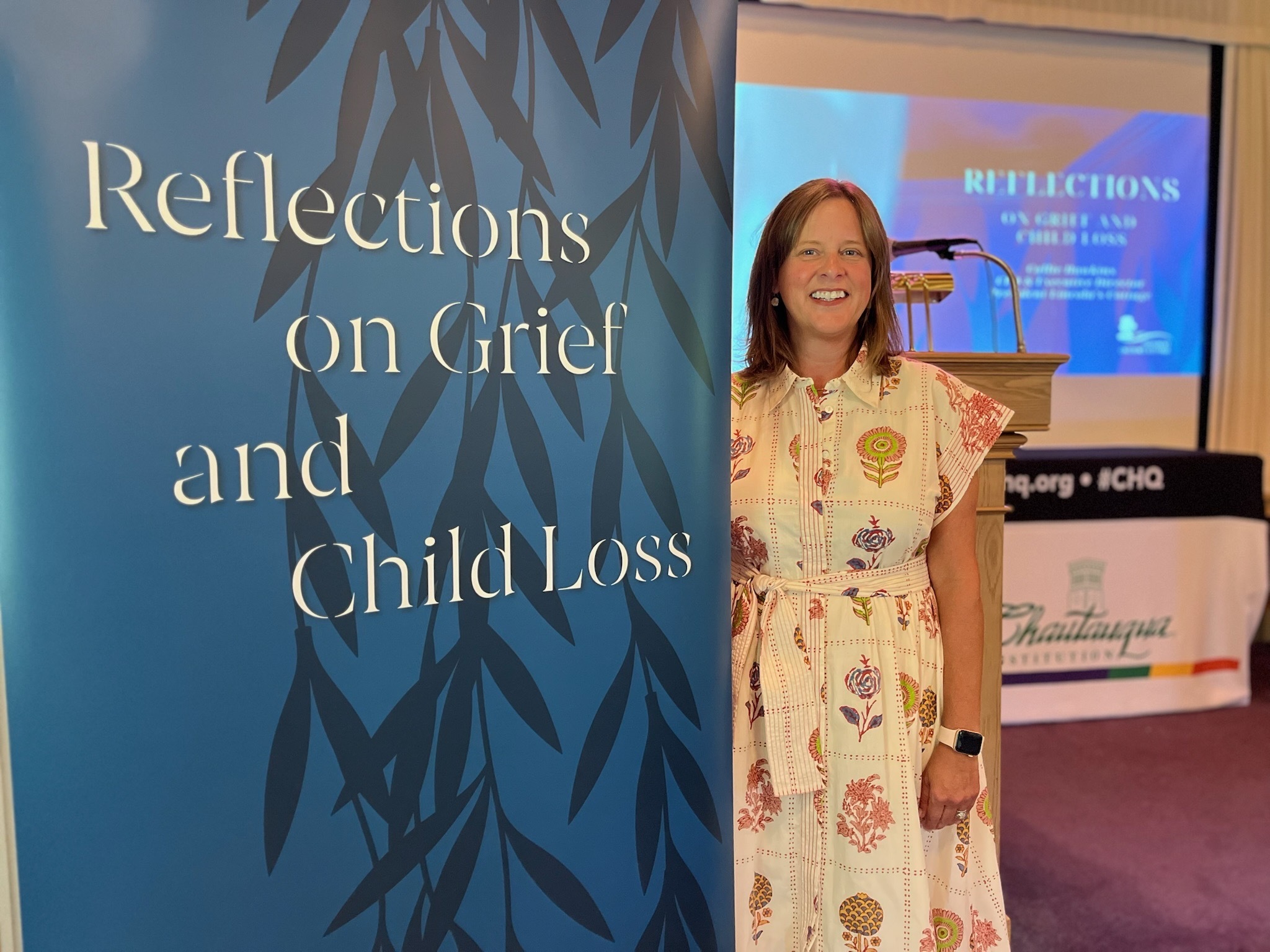
The list of visitors to the Chautauqua Institution reads like an American History book index. Jane Addams, Lucille Ball, Amelia Earhart, Duke Ellington, Teddy Roosevelt, and Booker T. Washington are just some of the giants who have graced the stages, lecture halls, and amphitheaters of the lifelong-learning center in upstate New York since its founding in 1874.
Last month, several members of the President Lincoln’s Cottage staff, myself included, were honored to join in that rich history during week three of the 2025 season, a week focused on community building through art.* Author George Saunders was in residence with the Metropolitan Opera to workshop the upcoming Lincoln in the Bardo opera, a conjuring of his Booker Prize-winning ghost story composed by Missy Mazzoli.
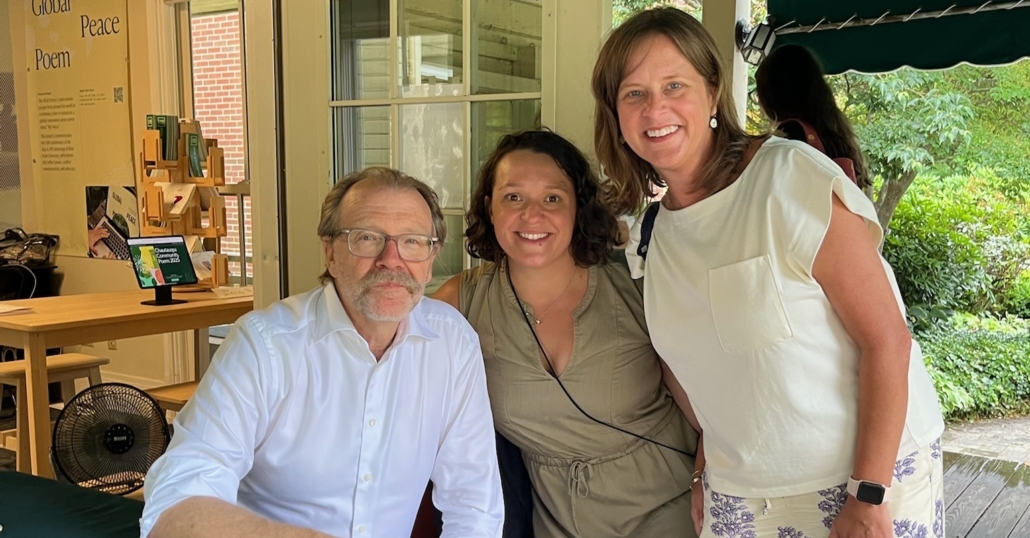
Left to right: George Saunders with Cottage staff members Cameron Walpole and Callie Hawkins in front of the poetry center at Chautauqua
The Cottage was there to complement the workshop and the story’s themes with programming surrounding grief and loss. Our aim was to both deepen understanding of the Lincolns’ story and exemplify how cultural institutions can support community-building through exhibits and programming that focus on the human experience.
As you likely know, Lincoln in the Bardo is a novel that uses anguished voices of the past, both real and reimagined, to explore Lincoln’s grief after the death of his son Willie. This grief also propelled him to seek refuge with his family at a bucolic place known today as President Lincoln’s Cottage. Saunders’ novel is especially resonant to us, entwined as it is with our own origin story.
The grief-related programming that we brought to Chautauqua was an extension of our ongoing work to connect the story of the Lincolns’ grief with modern families experiencing loss. This work began in 2020 with the opening of our award-winning special exhibit, Reflections on Grief and Child Loss. Chautauqua was the first stop for our new mobile version of the exhibit and provided the backdrop for the Masters Series classes on grief held throughout the week. These classes were developed with friends of the Cottage whose work on grief has influenced our own.
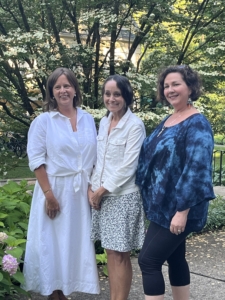
Left to Right: Callie Hawkins, Dr. Stacy Lynn, and Karla Helbert
On Tuesday, Callie Hawkins, our CEO & Executive Director, introduced our work with a master class on the creation and impact of Reflections on Grief and Child Loss. She described how the isolation she experienced after the death of her son Coley in 2018 was mitigated in a way by the deepened connection she felt to the Lincoln family. This juxtaposition led to the development of Reflections on Grief and Child Loss, which gently, candidly examines grief and loss as universal human experiences that span time and geography.
Grief therapist Karla Helbert led two classes on movement through grief and has also been involved with Reflections on Grief and Child Loss from its nascent days. Her therapeutic insights helped shape our curatorial approach and her son Theo is one of the modern children memorialized in the exhibit alongside Willie, Eddy, and Tad Lincoln.
Karla infuses her therapy with holistic, spiritual, and movement therapy that includes a yoga practice. During her sessions, she explained that “emotion” comes from the Latin verb meaning ‘to move,’ and that our emotions are meant to flow. Getting your body moving when you are in the throes of grief is a way to honor that flow. Unleashing your creativity is another way. After the yoga portion of her workshops, students visualized, then drew, representations of their own grief. As people moved their bodies, shared their stories, and drew their internal experiences, the group became viscerally closer, a micro-community formed in the course of each session.
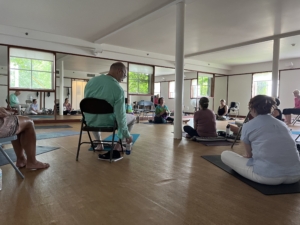
Karla’s class on moving through grief
On the Thursday before the opera workshop, our third presenter, Dr. Stacy Lynn, spoke from a small chapel by the opera house about the importance of developing historical empathy. Her new biography, Loving Lincoln: A Personal History of the Women Who Shaped
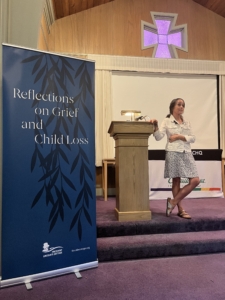
Stacy presenting on historical empathy
Lincoln’s Life and Legacy, looks at the women who populated, shaped, and told Lincoln’s story. After many years as a Lincoln scholar, her own grief after the death of her daughter Mackenzie in 2014, deepened her understanding of the bereaved first family, and of Mary Lincoln’s sorrow and resilience especially.
Stacy eventually became a character in her own book, one of the women connected to the Lincolns through shared experience. By connecting the historical past with her personal story, she reveals the Lincolns to be both relevant and human. For Stacy, this process felt somewhat foreign after years in academia. Yet, it was exciting, rewarding, and natural. “I found the power of writing history from the heart,” she told the audience.
The week culminated in the opera (as all weeks should). Callie spoke for all of us when she described the Met’s workshop as “transcendent.” As the guests poured into the opera house, the Cottage team was outside, greeting the hundreds of operagoers with the mobile grief exhibit. As they left, wiping their eyes, they were offered the opportunity to remember their own loved ones by adding their names to vellum leaves. We have since brought these leaves back to the Cottage where they are hanging on the grieving willow at the heart of Reflections on Grief and Child Loss.
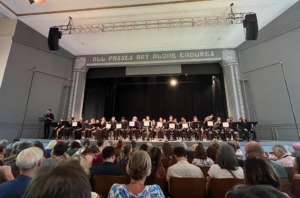
The Chautauqua workshop of Lincoln in the Bardo
Some day in the not-so-distant future, these names offered during our week at Chautauqua will be among the thousands transcribed onto seed paper and planted in a grief garden by the Cottage. The garden, like the exhibit itself, will be a place to visit and mourn and remember. Among those seeded names will be Willie Lincoln, whose short life and tragic death became the stuff of literature and opera, and whose memory has bridged the divide between the ages at a home, turned museum, where he was once so dearly missed.
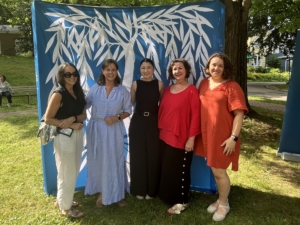
The team with the opera singer who voiced Willie Lincoln (center)
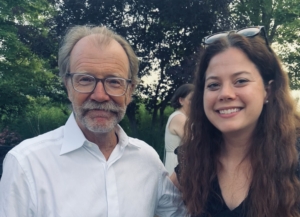
George Saunders and me
*Our week at Chautauqua was made possible by the generous support of the Rudolph Family Fund.
Rebecca Kilborne is the Senior Marketing & Communications Manager of President Lincoln’s Cottage.
